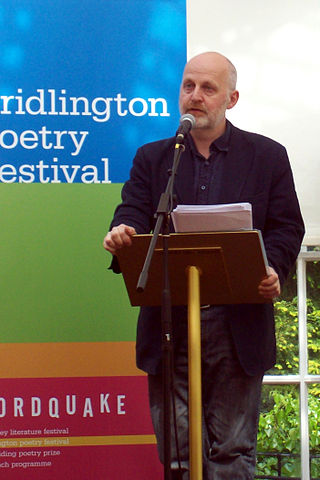Related Research Articles
Richard Caddel was a poet, publisher and editor who was a key figure in the British Poetry Revival.

Roy Fisher was an English poet and jazz pianist. His poetry shows an openness to both European and American modernist influences, whilst remaining grounded in the experience of living in the English Midlands. Fisher has experimented with a wide range of styles throughout his long career, largely working outside of the mainstream of post-war British poetry. He has been admired by poets and critics as diverse as Donald Davie, Eric Mottram, Marjorie Perloff, Sean O’Brien, Peter Robinson, Mario Petrucci and Gael Turnbull.
Gael Turnbull was a Scottish poet who was an important figure in the British Poetry Revival of the 1960s and 1970s.

Lee Harwood was an English poet associated with the British Poetry Revival.

Donald Paterson is a Scottish poet, writer and musician. His work has won several awards, including the Forward Poetry Prize, the T. S. Eliot Prize and the Geoffrey Faber Memorial Prize. He was recipient of the Queen's Gold Medal for Poetry 2009.

Peter Robinson is a British poet born in Salford, Lancashire.

Vahni Anthony Ezekiel Capildeo is a Trinidad and Tobago-born British writer, and a member of the extended Capildeo family that has produced notable Trinidadian politicians and writers.

Harry Guest was a British poet born in Wales.
Laurence James Duggan, known as Laurie Duggan, is an Australian poet, editor, and translator.
M. T. C. Cronin is a contemporary Australian poet.
Robin Fulton is a Scottish poet and translator, born on 6 May 1937 on the Isle of Arran. Since 2011 he has published under the name Robin Fulton Macpherson.
Richard Berengarten is an English poet. Having lived in Italy, Greece, the US and the former Yugoslavia, his perspectives as a poet combine English, French, Mediterranean, Jewish, Slavic, American and Oriental influences. His poems explore historical and political material, inner worlds and their archetypal resonances, and relationships and everyday life. His work is marked by its multicultural frames of reference, depth of themes, and variety of forms. In the 1970s, he founded and ran the international Cambridge Poetry Festival. He has been an important presence in contemporary poetry for the past 40 years, and his work has been translated into more than 90 languages.
Veronica Elizabeth Marian Forrest-Thomson was a poet and a critical theorist brought up in Scotland. Her 1978 study Poetic Artifice: A Theory of Twentieth-Century Poetry was reissued in 2016.
Catherine Walsh is an Irish poet.
Peter Dent is an English editor, poet, and former school teacher whose poetry has moved from spare notations to linguistic experiments.
Tony Lopez is an English poet who first began to be published in the 1970s. His writing was at once recognised for its attention to language, and for his ability to compose a coherent book, rather than a number of poems accidentally printed together. He is best known for his book False Memory, first published in the United States and much anthologised.
Robert Sheppard is British poet and critic. He is at the forefront of the movement sometimes called "linguistically innovative poetry."

Ágnes Lehóczky is a Hungarian-British poet, academic, and translator born in Budapest in 1976.
Màiri nighean Alasdair Ruaidh (c.1615–c.1707), also known as Mary Macleod, was a Scottish Gaelic poet.

Deborah Meadows is an American poet and playwright and essayist.
References
- ↑ "The Eric Gregory Trust Fund Awards: Past winners". Society of Authors. Archived from the original on 26 July 2014. Retrieved 22 July 2014.
{{cite web}}: CS1 maint: unfit URL (link) - 1 2 Bradshaw, D.C.A. (2013). Bringing Learning to Life: The Learning Revolution, The Economy and the Individual. Routledge. ISBN 9781136670459 . Retrieved 22 July 2014.
He entered the library profession after distinguished studies at Edinburgh and Sheffield universities and his previous posts have been at the university of Liverpool, Cork and Sheffield ...
- ↑ "Alasdair Paterson". Scottish Poetry Library. Retrieved 22 July 2014.
- ↑ Mason, Edgar (13 May 2011). "Alasdair Paterson's grand poetry of Byzantine governance". The Fortnightly Review. Retrieved 22 July 2014.
- ↑ "Alasdair Paterson". World Haiku Association. 2001. Retrieved 22 July 2014.
- ↑ Myhill, Martin. "Martin Myhill" . Retrieved 22 July 2014.A colleague's webpage